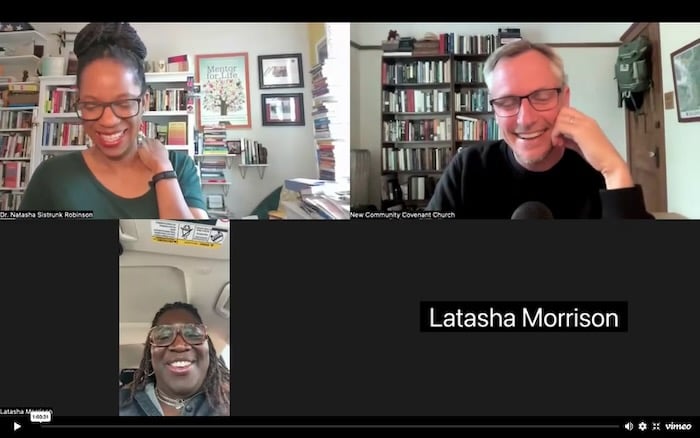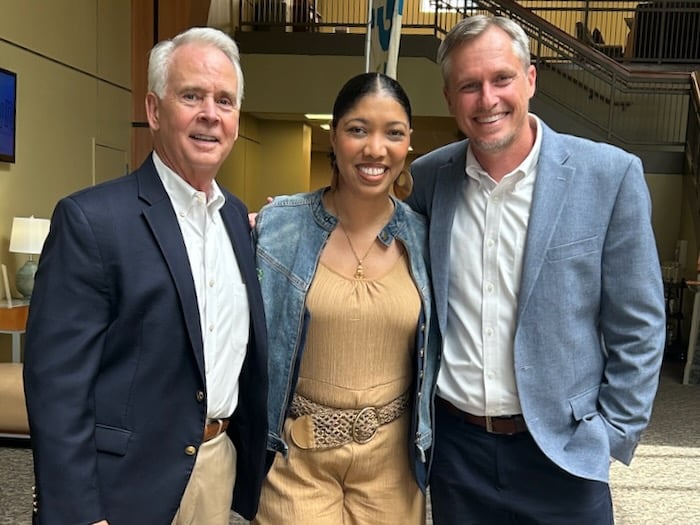Reconciliation and Undermining the Racial Binary
Refusing to conform to simplistic assumptions

A common challenge faced by ministries committed to racial reconciliation is responding to the so-called racial binary. Given the history of the United States, it has often been assumed that race is a Black-white construct. Practically, this means noticing the ways that white and Black cultures developed in response – often in opposition – to one another. It can also mean assuming that reconciliation must begin with Black and white people before, at some unforeseen time in the future, including everyone else. It sometimes means assuming that everyone else identifies with one side or the other of the binary.
The obvious shortcomings of conceiving of race in these simplistic this-or-that terms can prompt some to downplay the very real power of white supremacy and anti-Black racism. In an attempt to include everyone in the experience of reconciliation, some lean toward a kind-of colorblind approach which attempt to welcome and celebrate every person and the cultures they represent. For example, recognizing cultural heritage months can be a way a church welcomes and honors its diverse members. But it’s also possible for these regular celebrations to distract from the real, particular, pervasive power still exerted by anti-Black racism and white supremacy.
Still, the desire to push past the racial binary is right and there are ways we can take steps in that direction without succumbing to colorblindness. This begins with multiracial churches regularly acknowledging the history which has shaped its members. Most basically, this must include the erasure of Indigenous people, the pervasiveness of white supremacy, and the legacy of anti-Black racism. Regardless of someone’s race or how recent their arrival in this country, each of these three historical forces have dramatically shaped their society and how, in turn, society is shaping them. A healthy multiracial church will include, for example, Asian American members who can reflect thoughtfully about the personal and structural impacts of anti-Black racism. Similarly, its white members will question the idea that the United States is a nation of immigrants, recognizing how the genocide of Indigenous communities and the kidnapping and enslavement of African people are thoroughly American realities.
But holding these basic facts of our shared history cannot mean diminishing the experiences of those who can’t easily see themselves in it. Rather, regularly recognizing the genocide, supremacy, and racism which have shaped our society opens space for everyone to find their place in this fraught story. For instance, the history of Asian Americans in this country, particularly as it demonstrates who receives the benefits of citizenship, has been profoundly shaped by the white supremacist instinct to categorize certain people as perpetual foreigners. Recognizing this dehumanizing force allows a reconciling church to be more hospitable to these members while also creating opportunities for interracial solidarity with others who’ve similarly endured this manifestation of white supremacy.
More than anything else, we can resist the racial binary by keeping in sight the sins which animate racism. By remembering that race exists as a justification for greed and theft, a reconciling community is less susceptible to the overly simplified racial binary. Why? Because we remain aware that the racial narratives which give rise to the binary are in service of a very old, pervasive project of exploitation and extraction. None of us residents of the contemporary world, a world utterly remade by plunder, have escaped these race-justified sins. Some of us have benefited in some narrowly defined material ways at the cost of our psychic, social, and emotional well-being; others have suffered catastrophically. But we have all been undone and reconfigured by societal structures built on greed and theft and obscured by race.
While the racial binary restricts those who can participate in the reconciliation project, centering the material causes behind racial injustice allows not only for everyone to be included in the conversation but for everyone to participate in repair. That repairative work will certainly look different for those who’ve often benefited from the racial status quo than it does for the women and men who’ve been most exploited by it, but repair requires everyone.
Given how U.S. society typically things simplistically about race, it’s likely that the racial binary will be with us for the foreseeable future. Thankfully, reconciling churches can undermine the assumptions of the binary. As we do, our communities will welcome more and more people to find their place in God’s good work of reconciliation and repair.
(Photo credit: Diana.)
This is an ongoing thinking-out-loud series about the faith-rooted racial reconciliation movement during these chaotic days. You can find previous entries here: Reconciliation and New Creation, Reconciliation and the Preferential Option, Reconciliation and Repair, Reconciliation and Warfare, Reconciliation and Prophetic Witness, Reconciliation and Politics, Reconciliation and Joy, Reconciliation and Place, and Reconciliation and Truth.
Race Against Gun Violence
Thank you to Dana who, along with other subscribers to this newsletter, has helped me reach 25% of my fundraising goal for the Race Against Gun Violence. All of the money I raise goes to the organization I helped to start, New Community Outreach. This year we’re serving over 200 high school students in our neighborhood who participate in weekly restorative justice cohorts. As the weather warms up, we’re gearing up for our summer leadership program and community garden. If you’ve appreciated anything about this newsletter, could you make a small donation toward my goal? Thanks very much!
Plundered Webinar
Did you miss the recent webinar with Dr. Natasha Sistrunk Robinson and Latasha Morrison? Here it is!

The View From Here

I got to spend a day in Alabama this week with my new friend Travis Collins, pastor of First Baptist in Huntsville. Travis is putting together a really thoughtful video curriculum about racial justice and it happened that my friend Dr. Christina Edmondson recorded just before me. Dr. Edmondson is one of the wisest people, the coauthor of Faithful Antiracism, and the cohost of one of my favorite podcasts, Truth’s Table.
Miscellaneous
A wonderful married couple I know is looking for a good church in the Reston, VA area. If you’ve got any leads, let me know and I’ll pass them on. Thanks!